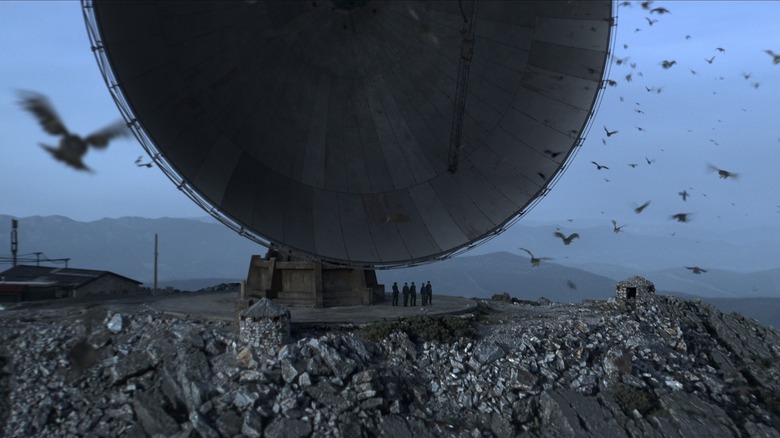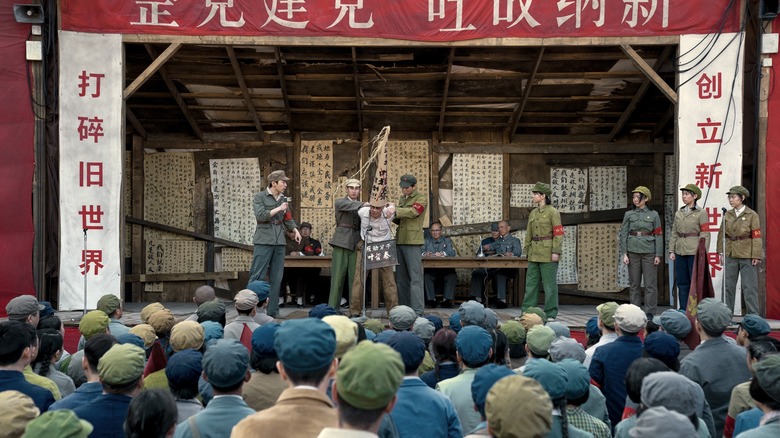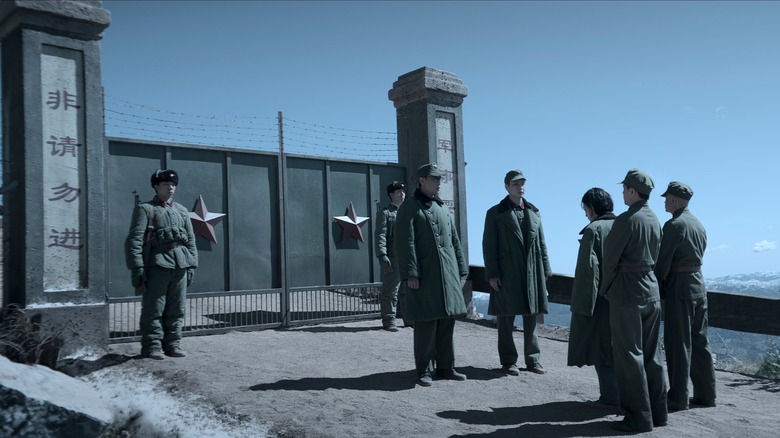Why Netflix's 3 Body Problem Is Facing International Controversy
If we had a nickel for every time a television series written by David Benioff and D.B. Weiss ended up courting a significant amount of controversy...
Years after their last major production came to a divisive end, the "Game of Thrones" creators have launched their next big-budget gambit with Netflix's "3 Body Problem" (reviewed for /Film by yours truly here), yet another boundary-pushing adaptation based on a series of novels long considered to be as dense and audience-unfriendly as it gets. Yeah, that definitely sounds familiar. But unlike author George R.R. Martin's much edgier and more modern take on the fantasy genre, Chinese writer Liu Cixin wrote his alien-invasion epic "The Three-Body Problem" (and the following two sequels, all referred to collectively as the "Remembrance of Earth's Past" trilogy) with much less provocative themes in mind — or, at least, provocative in very different ways.
Many streaming subscribers received their first taste of the show's incredibly hard sci-fi trappings after its debut this past weekend, but the wider conversation ultimately focused less on its real-world science or even its eerily Red Wedding-like act of violence late in the season. Instead, reports quickly began to circulate about polarizing reactions trickling in from the international community. As it so happens, one specific scene early on proved to be a particularly hot-button issue ... one that readers and longtime fans likely anticipated would pose a problem in the Hugo Award-winning book's first notable adaptation outside of Chinese borders.
In short, this story has it all. Here's how the intersection between censorship, artistic freedom, politics, and one tumultuous period in history all came together to put "3 Body Problem" squarely in the spotlight.
The Cultural Revolution
Look away now, "No politics in my art!" crowd. In one of the clearest demonstrations yet of how storytelling is inherently tied together with socio-political concerns, writer Liu Cixin had no recourse but to design "The Three-Body Problem" with censorship in mind. That required a little cat-and-mouse game in sneaking one of his most incendiary concepts past cultural gatekeepers in his native China: an unflinching depiction of the country's "Cultural Revolution."
Much like in English translations of the book, Netflix's "3 Body Problem" begins in 1966 Beijing amid a so-called "struggle session." Whipped into a frenzy by revolutionary leader Mao Zedong, students and other impressionable people sought to forcibly uproot established scholars, scientists, and other "bourgeois" intellectuals from positions of governmental influence. As accurately captured by Cixin, this involved harrowing anti-science demonstrations at universities and other cultural centers in which those accused of being capitalist sympathizers were dragged in front of angry mobs and forced to denounce their views. In an inspired choice, the author grounded the entire cosmic story of "The Three-Body Problem" in the fallout of one especially bloody rally, wherein main character Ye Wenjie (portrayed in the series by Zine Tseng for the younger version of the character and Rosalind Chao for the older) witnesses her father's brutal murder that would eventually motivate the most decisive act in (fictionalized) human history.
In its original publication, however, Cixin essentially had to hide this crucial chapter much later on in the hopes that it would slip past government censors. Historically, China has sought to downplay (at best) or outright deny (at worst) the facts behind this decade of violent upheaval. Pointedly setting a seminal work of literature during this historical event was itself a political statement ... and, unsurprisingly, put any future adaptation in the crosshairs.
The 3 Body controversy
As far as controversies go, this one was probably inevitable (though perhaps less so than the show's other source of behind-the-scenes drama). Since Netflix isn't available within Chinese borders, many viewers resorted to illicit means in order to see how this latest attempt to bring the seminal work to life in live action would compare, both to the original novels and China's own Mandarin-language adaptation by Tencent Video released in 2023. Of course, that version largely left out any sequences portraying the Cultural Revolution. The creators behind "3 Body Problem," meanwhile, were free from the constraints of government censorship to adapt such sensitive material as faithfully as they saw fit.
Predictably, the Netflix series was quick to make headlines in the story's original home country. CNN rounded up several reactions across a wide range of Chinese viewers — some of whom accused the adaptation of intentionally painting China in a negative light, while others recognized that these scenes were translated from the original almost word for word and with an eye for authenticity. (In a profile with GQ, episode director Derek Tsang revealed he sought secondhand accounts from the descendants of individuals who experienced the Cultural Revolution themselves.) For their part, the series creators anticipated possible backlash — "None of us are writing with any particular axe to grind in relation to China," co-showrunner Alexander Woo once mentioned to The Hollywood Reporter — but forged ahead anyway in order to recreate the vibrancy and horrors found in Cixin's original story.
Without such a bracing opening sequence, it's undeniable that much of the season's momentum and stakes wouldn't hit nearly as hard. Whether it was handled with due sensitivity is now in the eye of the beholder.
"3 Body Problem" season 1 is currently streaming on Netflix.


